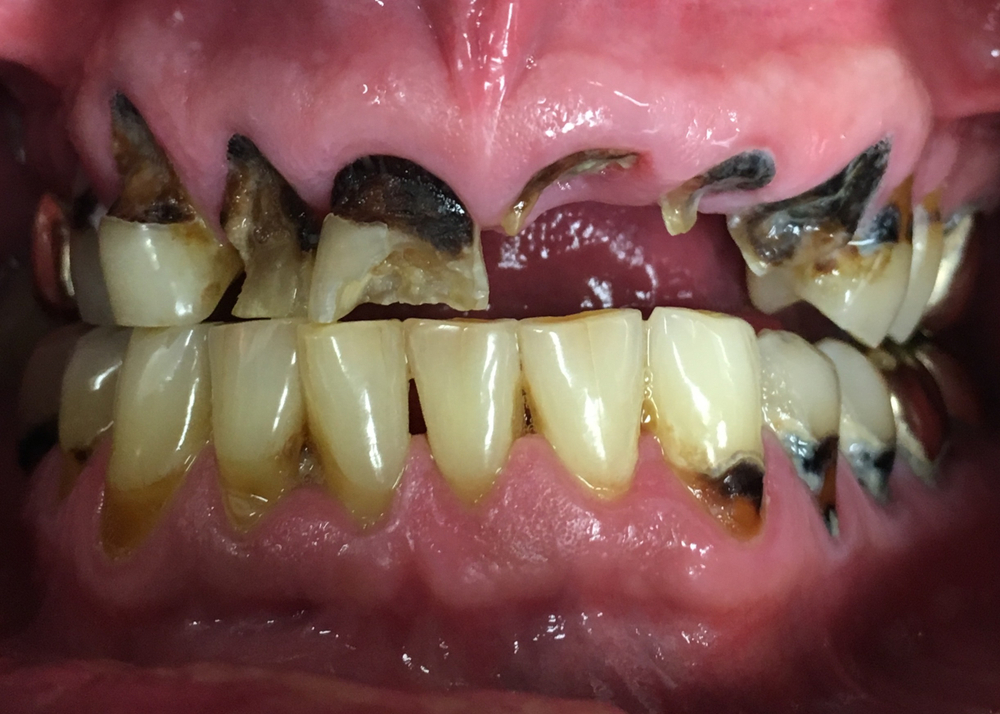Meth Mouth: Why Meth Destroys Your Teeth

Meth and Dental Health
Methamphetamine, more commonly known as meth, speed, glass, and crystal, is a dangerous and addictive prescription drug often used to treat narcolepsy and maintain blood pressure. However, meth can also be made synthetically and used as an illegal drug. Either way, meth is an extremely dangerous and addictive drug that can cause serious health consequences, including poor dental health.
A study published in “The Journal of the American Dental Association” by the National Institute on Drug Abuse studied the mouths of 571 meth users. The results revealed:
- 96% had cavities
- 58% had untreated tooth decay
- 31% had six or more missing teeth
- 23% retained all their natural teeth
- 89% of male users within the group suffered from periodontitis
- 85% of female users within the group suffered from periodontitis
The tooth decay found in people addicted to meth could be caused by a combination of drug-induced psychological and physiological changes that result in dry mouth and long periods of poor oral care. Plus, synthetic methamphetamine is acidic, made with battery acid, drain cleaner, antifreeze, and lantern fluid, so it decays the teeth. Studies show the more meth used, the worse the tooth decay.
What Is Meth Mouth?
Meth mouth refers to the mouth of a person who uses meth and its effects on their dental health. Typically, meth mouth is characterized by severe tooth decay and gum disease. Often, the teeth cannot be salvaged and are eventually removed. When people misuse meth, their teeth become blackened, stained, rotted, and fall apart. Signs of meth mouth may include:
- Dry mouth
- Cracked teeth
- Loose teeth
- Missing teeth
- Lockjaw
- Gum disease
- Gingivitis
- Periodontitis
- Carious lesions or micro-cavities
- Bruxism or teeth grinding
- Black rotting teeth
- Bad breath

There are many reasons why an individual may develop meth mouth, such as poor dental health, poor nutrition habits, and lack of regular dental maintenance. Many people who use meth may forget to brush their teeth or combine unhealthy, sugary food with meth use. Those with a meth addiction often may maintain poor diets and seek out soda and other sweets, known as buzzing, which damage enamel even further. The combination of meth with sugary foods contributes to cavities, and untreated cavities can cause nerve damage, tooth damage, and abscesses in the mouth. The dry mouth that comes from meth mouth dries out the salivary glands, which allows the mouth to produce more bacteria and rot the teeth. Eventually, this can lead to gum decay.
In many cases, teeth that have been impacted by meth must be removed, and dental procedures may be able to correct some of the issues caused by meth mouth.
5 Ways Meth Can Ruin Your Teeth
Meth is dangerous for many reasons, including damaging one’s teeth. These are five ways meth mouth can ruin your teeth.
No. 1: It causes dry mouth
Studies show that methamphetamine directly inhibits saliva flow from the salivary glands. Since saliva protects your teeth, the teeth are left defenseless to tooth decay when saliva stops flowing. Saliva helps fight the bacteria that form dental plaque and causes tooth decay and gum disease.
No. 2: It wears away tooth enamel
While pure methamphetamine isn’t acidic, most street meth is. Often made from a variety of acids, including battery acid, drain cleaner, antifreeze, and lantern fluid, synthetic meth is highly acidic. The acid from the drug, combined with the tendency to eat foods high in sugar, removes the enamel that protects your teeth, which changes the appearance of your teeth and causes cavities or infections.
No. 3: It causes you to grind your teeth
Because of the effects of meth on users, some individuals can be paranoid and anxious, causing them to clench their jaws and grind their teeth. Also known as bruxism, grinding teeth can cause a myriad of dental issues, such as:
- Abraded teeth
- Chipped or cracked teeth
- Facial pain
- Overly sensitive teeth
- Tense facial and jaw muscles
- Headaches
- Dislocation of the jaw
- Locking of the jaw
- Wearing away tooth enamel
- Tongue indentations
- Damage to the inside of the cheek
No. 4: It causes cavities
Cavities can happen because of a couple of different reasons. Regarding meth use, cavities are caused by two main factors. For one, meth often creates a craving for sugary foods and highly carbonated drinks, and the sugar in these substances turns into acid, which then causes cavities. Second, the acid in street drugs like methamphetamine contributes to tooth decay, increased bacteria, and cavities.
No. 5: It enables poor dental hygiene
When people are high on meth, they’re not usually concerned with the health of their teeth. Studies show that the more meth used, the worse the teeth were.
Find out ways to support a spouse in addiction recovery here:
Is There Treatment for Meth-Induced Dental Problems?
The first step towards treating meth-induced dental problems is getting help for meth addiction. Once a patient has gone through drug detox and is on the road to recovery, a dental professional can recommend repairing their teeth. Luckily, there are many options when it comes to dental recommendations.
Veneers can help stained teeth, and dentists can replace missing teeth with prosthetic devices like dentures or implants. When it comes to cavities, dentists can fill them in and recommend a mouthguard to protect from teeth grinding. When treating individuals with meth mouth, dental professionals may use preventative measures, such as topical fluorides, to protect teeth long-term.
Each person recovering from an addiction to meth have their own needs. Dental professionals may work with you to establish a treatment plan for your teeth, including a healthy lifestyle with good dietary choices and daily brushing and flossing.
Treatment for Meth Addiction at Novo Detox
If you or a loved one struggles with an addiction to meth, consider seeking help from the No. 1 medical detox and residential rehab center in Los Angeles, Novo Detox. At Novo Detox, you’ll work with addiction professionals who will try to keep you comfortable during detox, withdrawal, and the rest of the healing process. You can get the support you need to beat your addiction in a safe environment.
The first step of meth addiction treatment is detoxification. Detox is when you remove the drug entirely from your system, which can cause withdrawal symptoms. Meth withdrawal symptoms can include the following:
- Sweating
- Tremors
- Nausea
- Confusion
- Insomnia
- Paranoia
- Hallucinations
- Fatigue
- General malaise
- Depression
- Seizures
Inpatient meth detox is always preferred, so patients have the professional medical resources they need to successfully and healthily detox from drugs and alcohol.
After you detox, it’s time to begin drug rehab. At Novo, you’ll work to address any underlying issues that contribute to your addiction through various therapy treatments while treating any cooccurring conditions and trauma. Since using meth can cause or worsen psychological issues like psychosis, anxiety, and major depression, a dual diagnosis program is often recommended.
At Novo Detox, you can choose inpatient treatment, also known as residential treatment, or intensive outpatient treatment. No matter what type of treatment you choose, Novo Detox will help you achieve sober living. Call us at (844) 834-1777 to learn more today.




